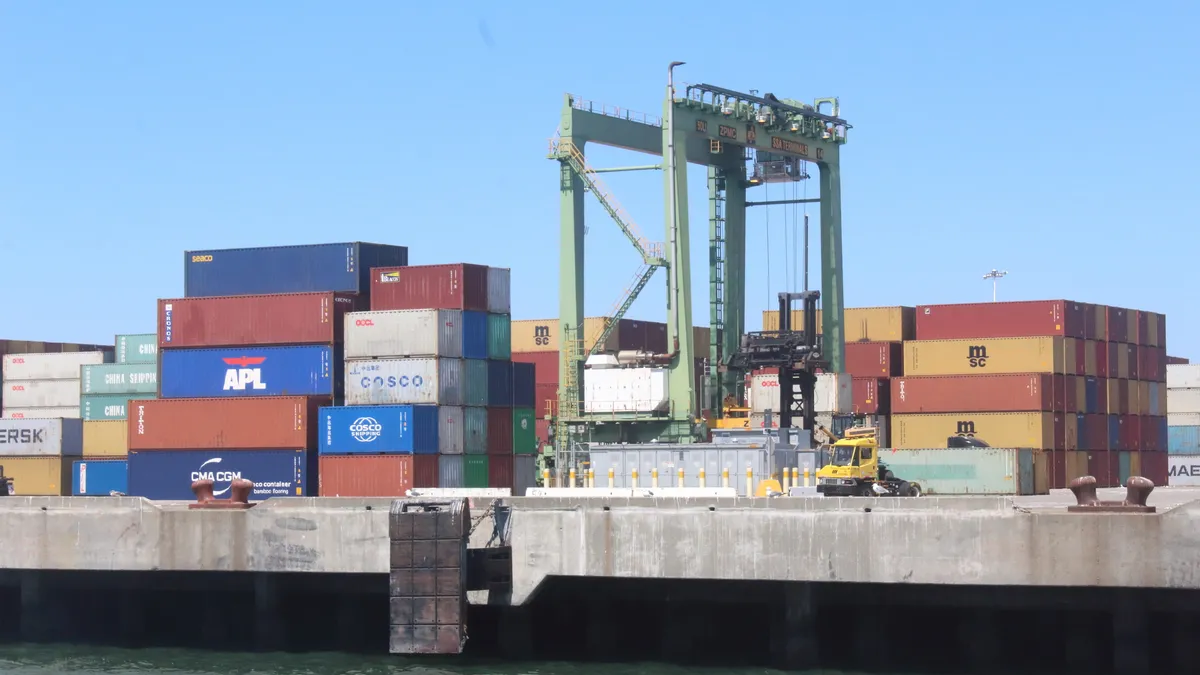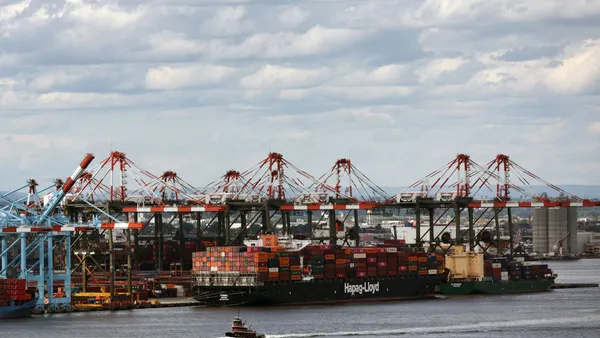Dive Brief:
- The Federal Maritime Commission (FMC) has issued final guidance on what constitutes fair detention and demurrage charges, the agency announced Tuesday. It adds two provisions to the proposed rule: One clarifies that the guidance can be used in the context of government inspections. The other clarifies that the FMC also reserves the right to consider "additional factors, arguments, and evidence" not explicitly laid out in the guidance. The rule will become effective when it is published in the Federal Register.
- This guidance comes as the coronavirus outbreak is exacerbating preexisting problems at ports. The FMC will assess the fairness of detention and demurrage charges by considering whether the fees are "incentivizing the movement of cargo and promoting freight fluidity." The commission may also consider the "content and clarity" of related policies and terminology for carrier and marine terminal operators. These considerations can also be applied to cargo availability and notice, and empty container return.
- The FMC's issuance also gives shippers guidelines for negotiating contracts with ocean carriers, Peter Friedmann, executive director of the Agriculture Transportation Coalition, told Supply Chain Dive. The FMC's guidance can inform how many free days a container can sit on the terminal, or parameters for when penalties can and cannot be charged, Friedmann said.
Dive Insight:
This announcement follows recent calls from dozens of industry groups for the FMC to give guidance and curb what two coalition letters called "unreasonable costs and significant burdens on the U.S. shipping public." One letter, sent to the FMC chairman mid-March, was signed by 67 groups. Another, sent to U.S. National Economic Council Director Larry Kudlow and U.S. Agriculture Secretary Sonny Perdue at the beginning of April, was signed by 80 food, beverage and agriculture groups.
"A lot of these issues of demurrage and detention are a result of the expanding size of the ships without the expansion of the terminals or the access to terminals," Friedmann said. "It also is a result of extraordinarily poor communication between the ocean carriers, their shipper customers, the marine terminals, the truckers."
The FMC noticed shippers' distress in December 2016, when a coalition of shipper groups submitted a petition to the agency. An ensuing fact-finding investigation began in March 2018, and a proposed rule was issued in September 2019. Although detention and demurrage fees had been plaguing shippers for years, the arrival of COVID-19 on the global stage made the situation more urgent.
"All of the terminals for the most part, aside from temporary closures, have remained open. Many have reduced hours of and reduced staff, but they're maintaining throughput," Taylor Tompkins, CCO and partner at Axiom Worldwide Logistix, told Supply Chain Dive. "But the problem is, the carriers have not aligned the demurrage and detention rules to match the hours of collection."
As a result of the pandemic, blank sailings, which have reached the scheduled peak, have disrupted freight flow and added an extra complication to timely container collection. If a carrier decides to continue imposing detention and demurrage fees in a canceled-sailing situation, it still could. The FMC has issued guidance, not a law. But Friedmann said the guidelines do give new clarity on how carriers should receive and respond to complaints about unfair detention and demurrage charges.
"Frankly, it's not our position to blame the carrier for canceling," he said. "If they don't have the cargo, there's no reason for them to run the ship. But when a carrier has to cancel sailing, it has a responsibility to its customers to alert them immediately when schedules change and to work with them to position their shipments in a reasonable and affordable manner for the next sailing."
Friedmann said the gist of the FMC's guidance is this: The carrier or marine terminal should not impose a detention or demurrage penalty for failure to pick up or return a container within the contracted free time, if the delay is no fault of the exporter, importer or trucker.
"How in the world should the marine terminal operator be allowed to charge a substantial penalty, on its behalf and the ocean carrier's — of $180 to $375, depending on the container, per day — when their trucker can't even get into the terminal, because the terminal is closed?" Friedmann said.
Detention and demurrage fees have become a major source of revenue, as, in aggregate, they amount to millions of dollars a year, he said.
"If [shippers] are spending more money on freight than they're making on the sale, then it'll all grind to a halt," he said. "Exporters and importers need the ocean carriers, and ocean carriers need the cargo."
Shefali Kapadia contributed to this report.














